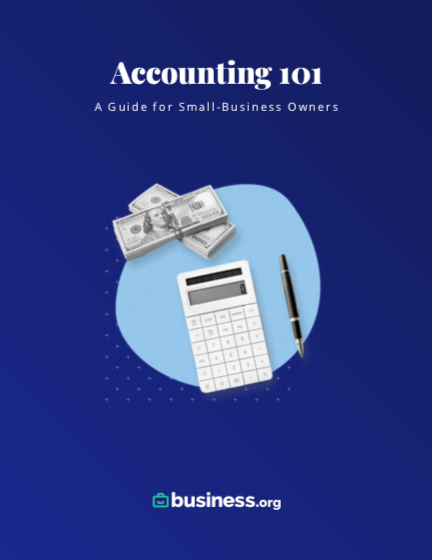We are committed to sharing unbiased reviews. Some of the links on our site are from our partners who compensate us. Read our editorial guidelines and advertising disclosure.
How a Pro Forma Statement Can Help Your Small Business
As a business owner, you know the importance of financial planning and forecasting.
Pro forma financial statements are powerful tools that can help you project future financial performance, assess potential investments, and evaluate the impact of business decisions.
By signing up I agree to the Terms of Use and Privacy Policy.
What does pro forma mean?
Pro forma is a Latin term that means "as a matter of form" or "for the sake of form."
In business and accounting, it describes financial statements that are based on assumptions or estimates rather than actual historical data.
Maybe you’re considering taking out a small business loan or merging with a larger company. A pro forma statement projects the impact of those decisions, showing whether your company’s financial health is expected to improve, decline, or remain the same after the event takes place.
Pro forma statements can omit certain information. For example, a company may exclude one-time expenses, such as restructuring costs or a legal settlement, in order to present a more accurate picture of ongoing operations.
Pro forma statements, budgets, and invoices are typically used for planning, forecasting, or decision-making purposes.
What are pro forma financial statements?
Pro forma financial statements forecast estimated future financial performance rather than relying solely on historical data.
Typically, these statements include a pro forma income statement, balance sheet, and cash flow statement, all based on hypothetical scenarios and assumptions.
Pro forma statements are usually preliminary or illustrative. They’re meant to give you a glimpse into a company's potential performance rather than strict adherence to the accounting rulebook.
Companies engaging in mergers and acquisitions often prepare pro forma financial statements to offer a picture of their future finances. These statements play a crucial role in negotiations and valuation discussions.
Sharing a pro forma statement also helps you communicate your growth strategy to lenders and investors.
Critics of pro forma financial statements argue that companies use this freedom to cherry-pick what to include or exclude, molding the numbers to fit a desired narrative.
Pro forma invoices
Pro forma invoices are preliminary invoices sent to customers before the actual transaction takes place. Think of it as a "pre-invoice.” It outlines the products or services being offered, their quantities, prices, and other essential details
Pro forma invoices are the preferred method of doing international business, according to the U.S. International Trade Administration.
These invoices allow buyers to obtain necessary permits or secure financing before goods are shipped out.
Pro forma invoices also assist with customs clearance by providing necessary information to custom officials for the import and export process. It’s like a financial roadmap to ensure a smooth international trade journey.
While regular invoices are binding and indicate an actual sale, pro forma invoices are a prelude to the real deal. Pro forma invoices don't demand payment or initiate financial transactions.
You can find basic templates for creating pro forma invoices online, or you can create your own with a Microsoft Excel spreadsheet.
Many accounting software programs, such as Sage Accounting and FreshBooks, offer features and templates specifically designed for generating pro forma invoices.
With Sage, for example, you can select a pro forma template, input the information, save a copy for your records, and email it directly to the client. There’s also an option to convert it to a full invoice later.
Different billing and invoicing software also offers this feature. Companies like Zoho Books, for example, offer a pro forma template on their website you can download and use for free.
For easier financial management, try accounting software
Data as of 5/3/23. Offers and availability may vary by location and are subject to change.
*Only available for businesses with an annual revenue beneath $50K USD
**Current offer: 50% off for 3 mos. or 30-day free trial
†Current offer: 50% off for three months or 30-day free trial
‡Current offer: 75% off for 3 mos. Available for new customers only
On a tight budget? Check out our picks for the best free accounting software.
Pro forma budgets
A pro forma budget is a projected financial plan that outlines anticipated revenue, expenses, and cash flows for a specific period.
Pro forma budgets can be useful for assessing the financial feasibility of new projects or projecting the impact of cost-cutting measures.
So, how is it different from a traditional budget?
A regular budget focuses on your current financial situation and sets spending limits based on historical data. It helps you manage day-to-day operations. A pro forma budget, on the other hand, takes things a step further by considering future events or changes.
Let’s say you're planning to launch a new product line. With a pro forma budget, you can estimate the revenue and expenses associated with your new venture. You might consider costs like research and development, manufacturing, marketing, and distribution.
By projecting the financial outcomes of your product launch, you can assess its viability and make adjustments before it goes live.
Downsides of pro forma statements
While pro forma statements serve a purpose, they can also be misleading. Excluding certain expenses or items can paint an overly optimistic — or even unrealistic — picture of a company's financial health.
Businesses have the freedom to use their own discretion when calculating pro forma earnings. They can include or exclude certain items based on what they believe truly represents their company's performance or future prospects.
Just remember, like any financial information, it's important to read between the lines and dig into the assumptions behind impressive pro forma numbers.
The U.S. Securities and Exchange Commission (SEC) requires companies to provide clear explanations on pro forma statements and reconcile pro forma figures to Generally Accepted Accounting Principles (GAAP).
Using pro forma projections to grossly misrepresent GAAP-based results and mislead investors is considered fraudulent and punishable by law under SEC regulations.
Rachel Christian is a Certified Educator in Personal Finance and a senior writer at The Penny Hoarder. She focuses on small businesses, retirement, investing and taxes.
Pro forma frequently asked questions (FAQs)
Businesses use pro forma statements to examine the potential impact of future events based on certain assumptions.
Pro forma statements allow companies to make informed decisions based on projections, attract investors, and assess the impact of mergers and acquisitions.
By adjusting for these events, businesses can gauge potential financial impact and make smarter strategic choices.
Pro forma statements are not bound by the same rigorous standards as audited financial statements. As a result, their accuracy heavily depends on the integrity of the company preparing them.
Pro forma statements rely on forward-looking information, which can be incredibly difficult to predict. Economic conditions, market dynamics and other external factors outside a company’s control can throw even the most well-researched pro forma statements off course.
That’s why you shouldn’t rely solely on pro forma financial statements.
Regular financial statements are prepared in accordance with Generally Accepted Accounting Principles and provide an accurate depiction of a company's historical financial performance.
Pro forma statements, on the other hand, are more like "what if" scenarios. They’re created to show how a company's financials might look under different situations or to exclude certain non-recurring costs.

With plans starting at $15 a month, FreshBooks is well-suited for freelancers, solopreneurs, and small-business owners alike.
- Track time and expenses
- Create custom invoices
- Accept online payments







